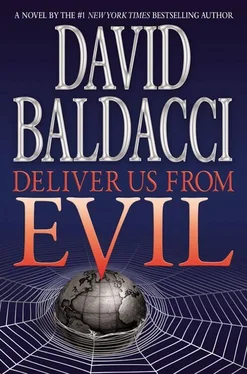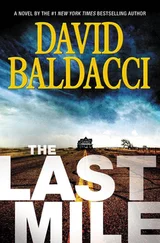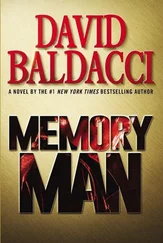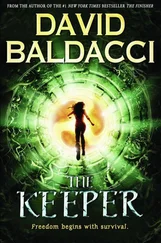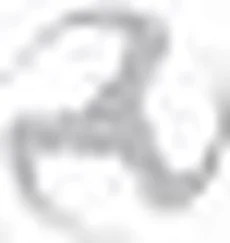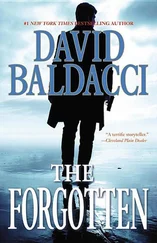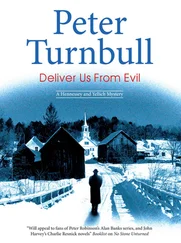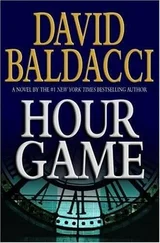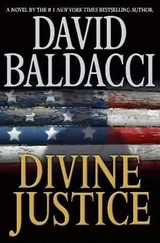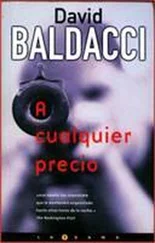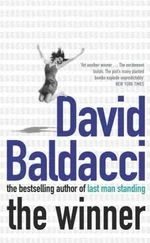“Wanted to see for myself the competition, I guess. Nice digs. My office is either at forty thousand feet or right at ground level with lots of excitement going on all around me.”
“Is that all?”
“Oh, there was something else. I wanted to make sure you weren’t still puking your guts out. See, I feel a little responsible for that. And I guess I wasn’t as sympathetic to you as I should have been while we were bouncing across the water.”
This drew a meager smile from Reggie. “Well, truthfully, I’m still a bit wobbly, but my bearings are slowly returning.” She paused while carefully pocketing the syringe. “Does your boss know that you’re here?”
“We’re not always in sync.”
She glanced once more in the direction of the old mansion. “Actually, I can relate to that. How long will you be in England?”
“That depends.”
“On what?”
“On whether you’ll agree to have dinner with me tonight. If yes, I’ll be here at least another day. If not, I’m out of here right now.”
Reggie glanced down.
“Problem getting away?” said Shaw.
“Actually we’ve all been given a spot of time off. But if anyone sees you. Whit or-”
“No one’s going to see me. I’ll go back out the way I came in. I kind of make a living sneaking around. But to be on the safe side let’s meet in London around eight tonight.” He gave her the name of a side street off Trafalgar Square. “We can pick a place to go after that.”
“Can I let you know?”
“Yeah, right now, or I’m flying out tonight. And I doubt I’ll be back, Reggie.”
“You don’t give a girl much time to make up her mind.”
“No, I really don’t.”
“All right. But what are we going to talk about at dinner?”
“Oh, I’m sure we’ll find something of mutual interest. And if we’re lucky, it might even be entertaining too.” He looked over her shoulder at the sunken ground of the cemetery. “And it might cheer you up a bit. Looks like you need it.”
“I guess it seems weird to you, my staring at graves.”
“No.”
“Why not?”
“Because I do it too.”
FEDIR KUCHIN had nothing, and because he had nothing the man was growing increasingly frustrated. In ninety-degree angles he paced the three-thousand-square-foot cabin perched near an ocean whose water temperature never got much above fifty degrees even in August. Kuchin’s mood was tied directly to his underling’s failure. Alan Rice had purchased access to a dozen databases and yet there had not been one hit on any of the digital images made from his drawings or the photo. Every other avenue of investigation he’d pursued had ended with a similar lack of progress. Kuchin’s large hands clenched and then loosened as his nimble mind galloped along trying to envision some way to move forward.
Finally, Kuchin drew on a parka and walked outside. He had taken with him a rifle and scope and some cartridges. It was summer but one wouldn’t know it by the weather. It wasn’t cold enough to snow, but as he looked around the terrain reminded him starkly of his birthplace in the Ukraine. Perhaps that’s why he’d built a home here with nothing else around for miles. He had two guards with him who stayed in another building five hundred meters from his house. Yet there wasn’t much danger out here. Other than the threat of being gored or trampled by a moose or a caribou, Kuchin felt fairly secure.
He trudged over ground that brought back memories of a little boy trailing his burly father as he went off to work. Work was fishing on a commercial trawler in the Sea of Azov. Forty thousand square kilometers in area, the Azov’s deepest point was surprisingly less than fifteen meters. It was in fact the shallowest sea in the world. Because of that its waters were turned over quickly. This did not keep it fresh, however. When Kuchin was a child the pollutants from factories and oil and gas exploration were already pouring into the sea’s meager depths.
By the 1970s dead and mutated fish by the thousands were piling up on the shores, clearly victims of man-made toxins and radioactive poisons. To swim in the waters today would be suicidal. Yet all the children in Kuchin’s village had spent their summers in waters whose temperatures would soar toward thirty degrees Celsius in July. In winter the sea would be frozen solid for months and the children would take their homemade skates and have races until their mothers would call out to them from shore to come eat their dinners. Kuchin could even remember lying facedown on the ice and licking it with his seven-year-old tongue.
Now Kuchin had heard that the Azov was in danger of becoming a dead sea and that commercial fishing should be banned for twenty years. This was not as draconian as it sounded. For forty years fishing yields had been reduced to nearly zero simply because all the sea life was dead. And yet he could recall vividly his father cleaning the fish he’d caught for their personal table with his big gutting knife, efficiently slicing up perch, sturgeon, and mackerel that his mother would then fry up in her big iron skillet with secret spices and ingredients that Frenchwomen seemed to naturally possess.
South of here was the Strait of Belle Isle, across from which was the region of Newfoundland. Kuchin had hiked there often and watched the cargo ships pass through the narrow channel. Indeed, some of his human cargo passed through these same waters. Before he reached adulthood Kuchin’s life had been inextricably tied to water, polluted water as it turned out. He realized it was probably a miracle he was not dead from some horrible cancer rising from the shallow depths of the Azov. Yet there could be tumors right now growing in his body, wrapping silently but lethally around essential organs, crushing blood vessels or invading his brain.
However, despite the environmental dangers of his childhood, growing up there had provided him with an ambition to succeed that had been inexhaustible. Everything he’d ever set out to do he’d achieved, which made this present situation unacceptable.
He made the trek to the Belle Strait and stared out at seawater that represented the most direct route to Europe for ships coming from either the St. Lawrence Seaway or Great Lakes ports. Yet fogs, gales, and ice-choked seas for ten months of the year made navigation here some of the most treacherous in the world. The strait could hold wondrous sights too, however. These included humpback whales doing spectacular flips and wandering icebergs calved from glaciers in Greenland and bundled south by the Labrador Current before starting to come apart, with massive crashes, into the warmer waters off the coast. And Belle Isle, after which the strait was named, meant “ Beautiful Island.” It sat at the eastern tip of the waterway and was roughly halfway between Labrador and Newfoundland, which together formed the Canadian province of the same name.
Beauty in the midst of nothing, thought Kuchin. He believed, however briefly, that he’d found beauty in Provence. A woman who intrigued him, bewitched him, even; one whom he thought he might like to possibly entertain for longer than one night without a bloody mess to clean up afterward. And yet the beauty had almost killed him. It was a sense of betrayal-even though realistically the woman owed him no measure of loyalty-that fueled Kuchin’s smoldering rage.
He walked up to the top of a small knoll, the strait behind him and the land in front of him flat for as far as the eye could see. Newfoundland was known as “the Rock.” Its eastern region used to be part of northern Africa. The last glaciation had scraped almost all the soil off the southeastern coast, leaving it with more rock than anything else, hence the nickname. Labrador, the easternmost section of the Canadian Shield, had roughly three times the landmass of Newfoundland but with approximately five percent of its population. Its climate was technically classified as polar tundra, and polar bears indeed prowled the coastal areas and caribou outnumbered people by over twenty to one. Here, Kuchin had his pick of massive mountains to hike, isolated bays in which to fish, barren tundra to ski across, and breathtaking and brutal fjords cut into bedrock by glacier saws to view. The slopes were often sheer and the current in the water deceptively fast.
Читать дальше
